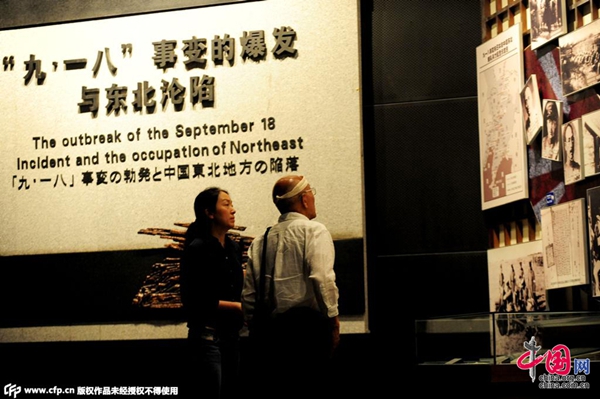The rise of contemporary China
- By Shen Dingli
 0 Comment(s)
0 Comment(s) Print
Print E-mail China.org.cn, August 12, 2015
E-mail China.org.cn, August 12, 2015
|
|
|
Maruyama Iwao, an 80-year-old Japanese man, arrives in Shenyang on July 27, 2015, and visits the 9.18 Historical Museum in the city. (Photo/CFP) |
This year marks the 70th anniversary of victory in China's War of Resistance against Japanese Aggression and in World War II. This bears great significance to the rise of contemporary China.
For a long time, China was ruled by feudal institutions. Because of its vast territory and advanced agriculture as well as its endowment with rich human resources, China was in the top tier of the world's leading countries several times in past centuries. However, it was still conquered by the Mongols and Manchu respectively in the past, though ethnic Han Chinese culture merged with the cultures of these ruling groups each time.
The massive Japanese invasion in 1937 brought China to an unprecedented low with the Rape of Nanking, the Chinese capital at the time. This aroused China's sense of national survival and forged an extraordinary anti-Japanese coalition. Though civil war ensued after the defeat of Japan, the Chinese united successfully under one banner for the sake of the nation during wartime.
China successfully revived itself through its great patriotic war, even though the cost of this conflict was very high. While the Japanese armed forces had some 800,000 casualties in China from 1937-1945, China lost nearly 30 million people during the war. China's sacrifice contributed to the course of all of World War II in the Pacific theater, winning China its place as a permanent member of the newly formed United Nations.
Altogether, approximately 2 million members of the Japanese armed forces occupied China's territory in the 1930s and 1940s, making China the most extensive battlefield on the ground in the Pacific region. Japan also brutally used chemical and biological weapons against Chinese in violation of the Geneva Convention of 1925. Consequently, China suffered tremendously, but the nation stood heroically against Japanese aggression.
China became the first republic in Asia in 1912, and it attained great power status in 1945 as one of the victorious Allied nations. Contemporary China rose on the world stage at that time and has sustained its global eminence ever since. The arrival of the People's Republic of China and its opening and reform has further raised China's international stature to its new present height.






